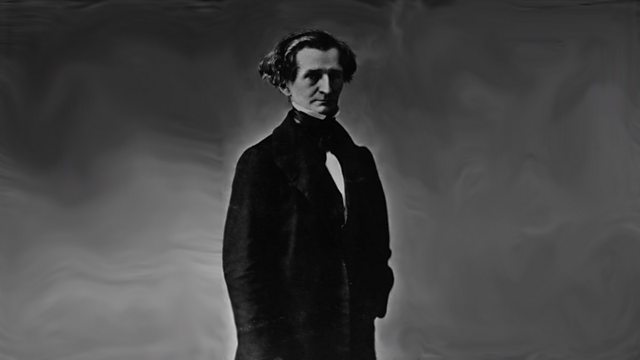
Berlioz and His Circle
Donald Macleod explores the life and music of Hector Berlioz. Today, we encounter some of the celebrated musicians he rubbed shoulders with – among them Liszt, Schumann and Wagner.
Donald Macleod explores the life and music of Hector Berlioz. Today, we encounter some of the celebrated musicians he rubbed shoulders with – among them Liszt, Cherubini, Schumann, Mendelssohn, Wagner and Paganini.
It’s easy to forget that the musical giants of the past were flesh-and-blood creatures whose social interactions were generally pretty much like anyone else’s. Berlioz’s first brush with the venerable Luigi Cherubini, director of the august Paris Conservatoire, has an air of farce about it, with the now sexagenarian maestro chasing the cheeky young whippersnapper around the Conservatoire library, sending books cascading in every direction, after a porter had reported him for entering the building by a door expressly designated for the use of female students. Berlioz’s relations with Franz Liszt were more decorous: Liszt paid him a call the day before the première of the Symphonie fantastique, then took him out to dinner afterwards. It was the beginning of a long and fruitful friendship, the fruits including a piano reduction by Liszt of Berlioz’s new symphony. It was in that piano reduction that Robert Schumann first became acquainted with the Symphonie fantastique, and he was so impressed with it that he published a lengthy and laudatory analysis of Berlioz’s work. The two men finally met in Leipzig some years later; apparently it was a somewhat stiff encounter, largely because neither spoke the other’s language. Berlioz became reacquainted with Felix Mendelssohn on the same trip – they had met in Rome over a decade before, when Berlioz was studying there as part of his Prix de Rome bursary. Berlioz held Mendelssohn in the highest regard, both as a man and a musician. The musically conservative Mendelssohn’s view of Berlioz was less flattering: while he recognized the genius of his French colleague’s music, he found much of it unsettling, describing the Symphonie fantastique as “utterly loathsome … nowhere a spark, no warmth, utter foolishness, contrived passion represented through every possible exaggerated orchestral means”. Berlioz’s relations with Richard Wagner were superficially cordial, but the two didn’t see eye to eye where music was concerned, Berlioz accusing Wagner of “wishing to reduce music to a series of expressive accents”, and Wagner, despite recognizing “the greatness and power of this unique and incomparable artist”, reflecting that every time he heard a major work by Berlioz he was “on the one hand thrilled, yet at times repelled, and sometimes even altogether bored.” Paganini had no such reservations about Berlioz’s music, declaring the composer to be “the successor to Beethoven”. Not only that, he was prepared to put his money where his mouth was: after hearing a performance of Berlioz’s Harold in Italy, Paganini dispatched his son, Achille, with a cheque for 20,000 francs, which gave Berlioz the financial freedom to compose his Romeo and Juliet symphony.
Messe solennelle (Quoniam tu solus Sanctus)
The Monteverdi Choir
Orchestre Révolutionnaire et Romantique
John Eliot Gardiner, conductor
Berlioz (arr. Franz Liszt)
Épisode de la vie d’un artiste – Grande Symphonie fantastique par Hector Berlioz, S470
(Un bal: Valse, Allegro ma non troppo)
Leslie Howard, piano
Le roi Lear, grande ouverture, Op 4
Pittsburgh Symphony Orchestra
Marek Janowski, conductor
Les nuits d’été, Op 7 (Absence)
Bernarda Fink, mezzo soprano
Deutsches Symphonie-Orchester Berlin
Kent Nagano, conductor
Romeo et Juliette, Op 17 (Part 3, Scène d’amour)
The Cleveland Orchestra and Chorus
Pierre Boulez, conductor
Produced by Chris Barstow for BBC Wales
Last on
More episodes
Next
You are at the last episode
Music Played
-
![]()
Hector Berlioz
Messe solennelle (Quoniam tu solus Sanctus)
Choir: Monteverdi Choir. Orchestra: Orchestre Révolutionnaire et Romantique. Conductor: Sir John Eliot Gardiner.- PHILIPS 442 137-2.
- PHILIPS.
- 5.
-
![]()
Hector Berlioz
Épisode de la vie d'un artiste (arr. Liszt)
Performer: Leslie Howard.- HYPERION CDA66433.
- HYPERION.
- 15.
-
![]()
Hector Berlioz
Le Roi Lear, grande ouverture, Op 4
Orchestra: Pittsburgh Symphony Orchestra. Conductor: Marek Janowski.- PENTATONE PTC5186338.
- PENTATONE.
- 9.
-
![]()
Hector Berlioz
Absence (Les nuits d'été, Op 7)
Performer: German Symphony Orchestra Berlin. Singer: Bernarda Fink. Conductor: Kent Nagano.- HARMONIA MUNDI : HMC-901932.
- HARMONIA MUNDI.
- 9.
-
![]()
Hector Berlioz
Romeo et Juliette, Op 17: Part III, Scène d'amour
Orchestra: The Cleveland Orchestra. Choir: Cleveland Chorus. Conductor: Pierre Boulez.- DG 474 237-2.
- DG.
- 6.
Broadcast
- Fri 15 Mar 2019 12:00BBC Radio 3








